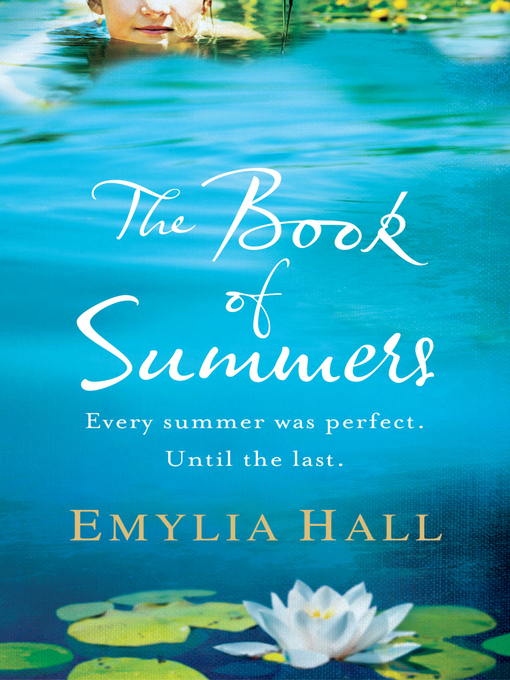 | Author: Emylia Hall
Publication date: 2012
Publisher: Headline Review
|
* Family. A word that has always sat so uneasily with me. For other people it may mean rambling dinners with elbows on tables and old jokes kneaded and pulled like baking dough. Or dotty aunts and long-suffering uncles awkwardly shaped, shift dresses and crappy moustaches, the hard press of a wellmeant hug. Or just a house on a street. Handprints pushed into soft cement. The knotted, fraying ropes of an old swing on an apple bough. But for me? None of that. It's a word that undoes me. Like the snagging of a thread on a jumper that runs unravelling quickly, into the cup of your hand. *
Since then, Beth hasn't allowed herself to think about those years of her childhood. But the arrival of The Book of Summers brings the past tumbling back into the present; as vivid, painful and vital as ever.
The Book of Summers caught my eye a long time ago, on the Waterstones' shelf, along with other summer reads. The back cover promised a trip to exotic Hungary, full of vivid descriptions and family mysteries and I must admit that, after eventually finishing it, I am rather disappointed.
Everything starts in England, when Beth receives a letter from Hungary, telling her that her mother Marika has died. With it comes the Book of Summers, which contains photographs of the seven wonderful holidays she spent in Hungary, before a tragic event put an end to this wonderful time.
In the first few pages already, we know that Marika has died. Most of the novel consists then of memories of Beth's life in England for a short time with both her parents, of her father and her in England and of her holiday in Hungary. Each chapter starts with the description of a picture, which reminds her of the summer it was taken and everything she experienced then, from the discovery of her mother's life and her first love.
As I expected, there are numerous descriptions of the places she visits. However, I felt that it was sometimes too much; too many adjectives in one sentence and, above all, the same places described several times. The advantage is that I have a precise image of Villa Serena, but I felt like the story was not really going anywhere, that everything was slow and that Beth did not really do much during the summer. It took me weeks to read it and unfortunately only the last third of the book really held my interest. The promise of a secret made me finish it: I wanted to know why Beth stopped going to Hungary, did not see her mother anymore and why everything changed. I must say that this twist in the plot was rather unexpected and Emylia Hall did not leave any clues which would enable the reader to guess the secret in the first chapters.
The setting is wonderful, but somehow artificial because we only get to know Beth through her summers in Hungary and we get to know people through her own eyes. It felt strange not to know much about her life in England, where she spends most of the time, and to have so many details about her yearly stay with her mother. In the same way, her relationships did not seem extremely realistic, probably because they were too stereotypical – a father with whom she cannot talk, an exotic and attractive mother, a wonderful boy she falls in love with at first sight and keeps loving through the years, although she only sees him a few weeks every year... I would have liked to know more about her feelings, because I do not have the impression that I got to know her at all, despite the three hundred pages I spent by her side.
While the beginning is slow, the end is rather quick. From the moment Beth discovers the secret that changes her life, everything moves on rapidly and we do not have time to think about her actions or the consequences of the decisions the characters made. The last pages are a little too romantic and unreal for my liking, but I enjoyed the fact that the author left it (rather) open and that everybody can have his own interpretation of what is going to happen.
Altogether, The Book of Summers did not live up to my expectations. I liked the general idea, the descriptions of Hungarian landscape, the way the story is built and the discovery of the secret, but the lack of balance disturbed me. I felt that everything was to descriptive while the story was not really going anywhere, that Beth's relationships to the other characters were artificial and that to understand her better and get to like her more, we would have needed to know more about her English life as well in order to compare it with her Hungarian summers. Nevertheless, it is Emylia Hall's first novel, a nice and easy summer read, and she will probably refine her style in her next publications.
Everything starts in England, when Beth receives a letter from Hungary, telling her that her mother Marika has died. With it comes the Book of Summers, which contains photographs of the seven wonderful holidays she spent in Hungary, before a tragic event put an end to this wonderful time.
In the first few pages already, we know that Marika has died. Most of the novel consists then of memories of Beth's life in England for a short time with both her parents, of her father and her in England and of her holiday in Hungary. Each chapter starts with the description of a picture, which reminds her of the summer it was taken and everything she experienced then, from the discovery of her mother's life and her first love.
As I expected, there are numerous descriptions of the places she visits. However, I felt that it was sometimes too much; too many adjectives in one sentence and, above all, the same places described several times. The advantage is that I have a precise image of Villa Serena, but I felt like the story was not really going anywhere, that everything was slow and that Beth did not really do much during the summer. It took me weeks to read it and unfortunately only the last third of the book really held my interest. The promise of a secret made me finish it: I wanted to know why Beth stopped going to Hungary, did not see her mother anymore and why everything changed. I must say that this twist in the plot was rather unexpected and Emylia Hall did not leave any clues which would enable the reader to guess the secret in the first chapters.
The setting is wonderful, but somehow artificial because we only get to know Beth through her summers in Hungary and we get to know people through her own eyes. It felt strange not to know much about her life in England, where she spends most of the time, and to have so many details about her yearly stay with her mother. In the same way, her relationships did not seem extremely realistic, probably because they were too stereotypical – a father with whom she cannot talk, an exotic and attractive mother, a wonderful boy she falls in love with at first sight and keeps loving through the years, although she only sees him a few weeks every year... I would have liked to know more about her feelings, because I do not have the impression that I got to know her at all, despite the three hundred pages I spent by her side.
While the beginning is slow, the end is rather quick. From the moment Beth discovers the secret that changes her life, everything moves on rapidly and we do not have time to think about her actions or the consequences of the decisions the characters made. The last pages are a little too romantic and unreal for my liking, but I enjoyed the fact that the author left it (rather) open and that everybody can have his own interpretation of what is going to happen.
Altogether, The Book of Summers did not live up to my expectations. I liked the general idea, the descriptions of Hungarian landscape, the way the story is built and the discovery of the secret, but the lack of balance disturbed me. I felt that everything was to descriptive while the story was not really going anywhere, that Beth's relationships to the other characters were artificial and that to understand her better and get to like her more, we would have needed to know more about her English life as well in order to compare it with her Hungarian summers. Nevertheless, it is Emylia Hall's first novel, a nice and easy summer read, and she will probably refine her style in her next publications.
















0 comments:
Post a Comment